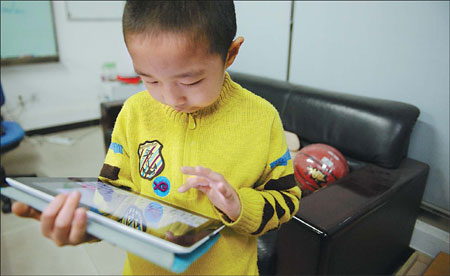Tablet taboos
Updated: 2012-12-07 09:09
By Liu Zhihua and Sun Ye (China Daily)
|
|||||||||||
|
Children addicted to computers could develop anti-social behavior, eyesight problems and bad posture leading to back problems. Wei Xiaohao / China Daily |

Keep the iPad away from the very young and ration the time children spend playing on tablet computers
The iPad or any other tablet computer should not be used as a surrogate nanny, even if they keep the child occupied and quiet. And while early computer skills may give the young an advantage in learning, it may also pose potential health risks. More observant parents are discovering that their children are getting addicted to screens too young as more families in China own a plethora of gadgets and an increasing number of toddlers and young children gain access to these digital devices.
For the parents, tablets such as the iPad are double-edged swords. On one hand, they can be used as an educational tool, an entertainment platform and even a baby-sitting option. But they are also fearful of the potential threats and consequences.
Tong Lei, 33, a purchasing executive and father to a 3-year-old girl in Shanghai, says he always tries to limit his daughter's iPad time.
He gives the toddler an iPad only when there is no other way to make her happy and he tries to divert her attention away from the tablet as soon as she has stopped crying.
"I never allow her to play longer than 15 minutes every time," Tong says. "Babies love the iPad and it is an efficient way to entertain and appease them, but it harms their young eyes."
Tong also feels that keeping up with all the new apps that appear on the iPad may influence his daughter's concentration and make her too distracted.
He is also fearful of news reports that young children are suffering from early vision defects and degeneration of cervical vertebrae due to hunching over the tablets or computers too long.
Beijing resident Zhang Huihui recently managed to wean her 6-year-old son off the devices mainly because of health reasons, but it was a tough process.
Since she bought an iPad a year ago, her son played with it for at least 30 minutes every day.
At first, Zhang found it convenient, because the boy would watch cartoons quietly by himself, and saved her from having to pay him constant attention.
Later, however, she found that he had become addicted, turning on the tablet himself and watching the same cartoons over and again. She downloaded some educational apps to distract him from the cartoons, but they soon lost their novelty and he was back watching the cartoons.
"I thought about not allowing him to use the iPad anymore, but I dropped the idea after I realized how important it was to him. Even his father liked to play games on it," Zhang says.
"I was also afraid he would be excluded from his friends and classmates' discussions, if they played the iPad while he did not."
Her son exchanges Angry Birds and Plants vs Zombies toys and apps with his peers.
Zhang knows how popular and powerful iPad is. But there is another trend that worries her.
She has noticed that at nearly every party she goes to, children ranging from 2-year-olds to teenagers play on their iPad or smartphones by themselves, and don't speak or mix with others.
Last month, her son was diagnosed with an eye infection and Zhang finally decided not to let him play on the iPad again, even after his eyes are fully recovered.
"My son tends to be allergic to many things and I have to be careful. The doctor said he couldn't say if the iPad caused the infection, but it would definitely make it worse," Zhang says.
"So I told him I had to take it away for work, and he adjusted to life without an iPad much easier than I had expected, although he whined about it every morning and evening in the first week."
While Zhang's case is an extreme one, when it comes to their child's wellbeing, parents always try their best.
Fan Yifeng, a college teacher in Dalian, Liaoning province, bought his first iPad three years ago and now his family also owns Windows and Android tablets.
He allows his 9-year-old girl to play with the iPad for an hour every day.
"My daughter is loaded down with school work, so I want her to have some fun with the iPad," Fan says. "I always download the apps myself, and ask friends which are the good ones."
Cui Ying, a mother in Beijing, is also screening the apps downloaded on her tablet, and rationing time spent on the device.
Her secret is using educational apps that are updated often, but not too frequently.
Currently, her daughter has been playing with a games app that updates once a day after the 20-minute session is finished.
"When one session is over, she has to wait for a day before the next one comes," Cui says."Such apps are interesting and informative, but will not be addictive."
Cui is happy that her daughter is contented with her daily quota on the iPad, and her vision stays sharp.
"You can't stop kids playing iPad entirely. A better way is to make them realize the iPad is just another average toy," Cui says. "I don't see anything bad if it is used correctly."
Experts agree that parents need to supervise their children's time spent on watching television, the computer and now, mobile devices such as the tablet or cell phone. This is important for healthy physical and psychological development, they say.
Children have smaller eyeballs and have to exert their eye muscles to concentrate on small screens.
Prolonged sessions with iPad screen with animated texts, images and backgrounds will increase the likelihood of myopia and other eye problems.
The sedentary postures also aggravate the situation, according to Zhou Zhe, an ophthalmologist at Beijing Tongren Hospital.
Children in their pre-teens and teens are in the most important phase for bone building. If they stay in a fixed position for too long, it will affect normal, healthy bone growth.
"Many parents know the tablets or computers may harm their children's eyes, but they are less aware of the harm to bone development and structure," says Liu Zhongjun, director at the Orthopedics Department of Peking University No 3 Hospital.
"Once the bones develop abnormal growth, it is very hard to reverse."
The most vulnerable bone structures are the cervical, thoracic, and lumber vertebra, and there are more and more children with unnaturally curved necks, due to an over-indulgence in digital devices, and bad sitting postures, Liu adds.
In addition, children left alone on the computers may be risking psychological damage.
"Children under middle-school-age are fast learners of how to communicate and play out their social roles," says Pang Yu, a psychologist and deputy director with Beijing Huilongguan Hospital, a leading mental institution in Beijing.
"If they get too immersed in the cyber world and miss real opportunities of communicating with others, they may delay language and intelligence development, or have difficulty dealing with inter-personal relationships later in life."
Studies have shown that children who overdose on television tend to receive information passively and lack communication skills. The same problem is surfacing with children who are left alone to use computers, tablets and cellphones, Pang says.
Contact the writers at liuzhihua@chinadaily.com.cn and sunye@chinadaily.com.cn.
(China Daily 12/07/2012 page24)
Today's Top News
Rescuers race against time for quake victims
Telecom workers restore links
Coal mine blast kills 18 in Jilin
Intl scholarship puts China on the map
More bird flu patients discharged
Gold loses sheen, but still a safe bet
US 'turns blind eye to human rights'
Telecom workers restore links
Hot Topics
Lunar probe , China growth forecasts, Emission rules get tougher, China seen through 'colored lens', International board,
Editor's Picks

|

|

|

|

|

|






